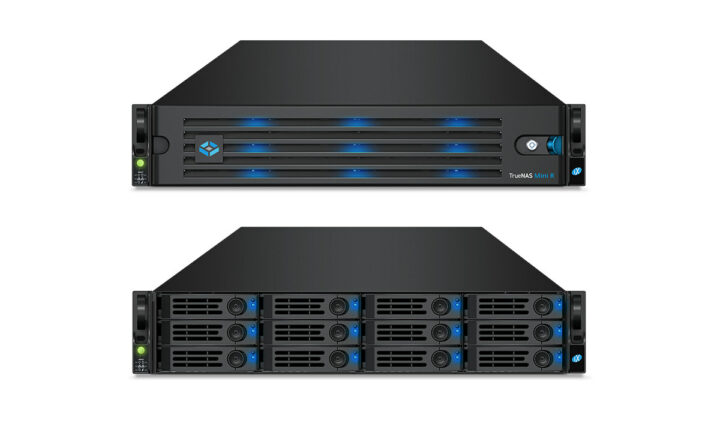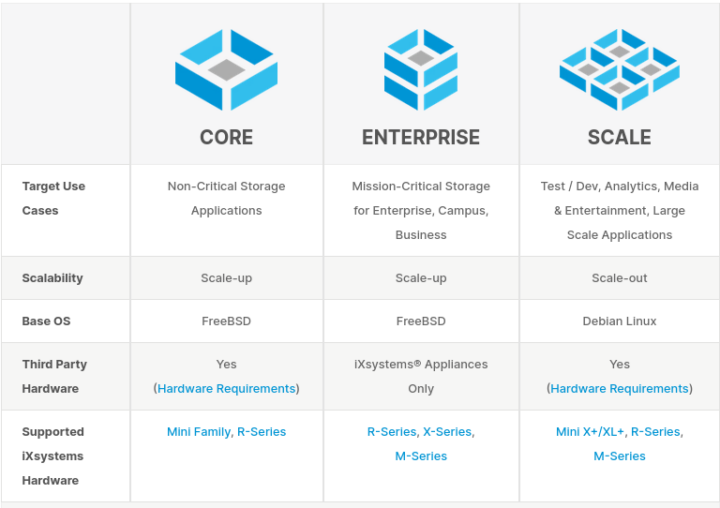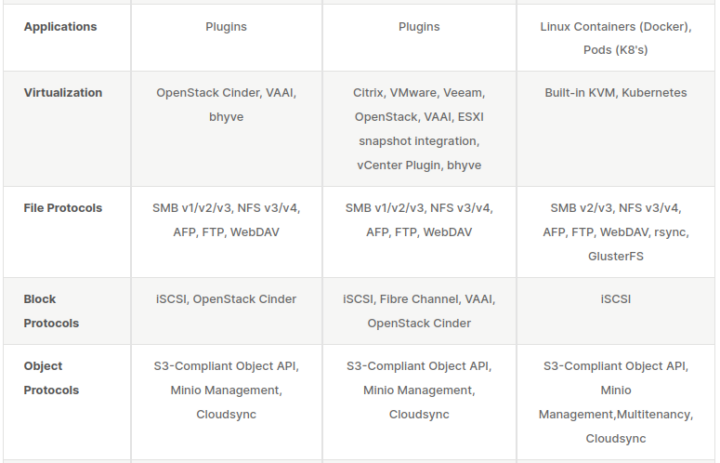iXsystems’ TrueNAS Mini R rack-mountable system powered by an Intel Atom C3758 processor running TrueNAS CORE or the new TrueNAS SCALE and equipped with up to 64GB RAM and twelve lockable and hot-swappable 3.5-inch drive bays for more than 200TB of capacity when populated with 18TB drives and 2.5-inch SSD adapters can be provided as well.
The TrueNAS Mini R also offers two 10GbE RJ45 interfaces and an optional dual 10GbE SFP+ card can also be added to the system., an IPMI out-of-band management interface, and the company says it’s mostly suitable for small and home offices, as well as enterprise deployments for remote sites, backup, labs, and non-critical departmental applications.
TrueNAS Mini specifications:
- SoC – Intel Atom C3758 octa-core Denverton processor clocked at up to @ 2.2 GHz with 16MB cache; 25W TDP
- System Memory – 32 or 64GB ECC RAM
- Storage
- 12 x 3.5-inch hot-swappable bays (can support 2.5-inch drives with optional adapters)
- M.2 NVMe boot device (250GB)
- Networking
- 2x 1/10GbE RJ45 ports
- Dedicated IPMI (10/100/1000 MbE) with full KVM over HTML5
- USB – 1x USB 3.0 port, 2x USB 2.0 ports
- Expansion – PCIe x4 Gen 3.0
- Optional accessories:
- 2.5-inch drive adapters
- Dual 10GbE SFP+ NIC
- Long rails for deeper racks (26.5-inch to 36.4-inch)
- Power Supply
- Non-Redundant 100V-240V AC, 50/60Hz single phase power supply
- Less than 170W fully populated under load
- Dimensions
- 533 x 437 x 89 mm
- Standard 19-inch Rackmount Width, 2U height, and a Depth of 21-inch
- Short rails for compact racks (19-inch to 26.6-inch)
- Adhesive rubber feet for desktop/shelf deployments
- Weight – 8.5 kg
- Noise levels – 45dB Idle and 52dB Peak
The TrueNAS Mini R ships with TrueNAS CORE (previously FreeNAS) but an optional sidegrade to TrueNAS SCALE is also possible. I had already mentioned TrueNAS SCALE in a post about a Storaxa 3-in-1 5-bay NAS, and I did not realize it was new at the time, but TrueNAS SCALE is as much a piece of news as the Mini R system.
All three versions of TrueNAS support many of the same features, but the main difference is that TrueNAS SCALE is based on Debian Linux instead of FreeBSD, which leads to differences in terms of supported applications (e.g. plugins vs Docket Linux containers), virtualization (e.g. OpenStack vs Kubernetes), and so on.
I had read forum threads in the past where people wanted to run FreeNAS on Arm, but each time they were told it was not going to happen, so I asked a company representative who contacted CNX Software if the new TrueNAS SCALE would be cross-platform or limited to x86. Here’s the answer:
TrueNAS SCALE is a cross-platform operating system that can run on x86 hardware as well as other hardware architectures. Here are some examples of the hardware platforms that TrueNAS SCALE can operate on:
x86-64 CPUs: TrueNAS SCALE can run on a wide range of x86-64 hardware, including desktops, laptops, servers, and virtual machines.
ARM64 CPUs: TrueNAS SCALE supports ARM64 CPUs, which are commonly found in many embedded devices and single-board computers like the Raspberry Pi.
Virtual machines: TrueNAS SCALE can be installed as a virtual machine on hypervisors such as VMware, Hyper-V, Proxmox, and VirtualBox.
Cloud platforms: TrueNAS SCALE can be run on cloud platforms like Amazon Web Services (AWS), Microsoft Azure, and Google Cloud Platform (GCP).
I was also told that specific hardware requirements for TrueNAS SCALE will vary depending on the intended use case and workload, and minimum requirements include a system with a 64-bit CPU and at least 8GB of RAM. So that means if you ever wanted to run TrueNAS SCALE on a Raspberry Pi 4, you’d need to get the model with 8GB RAM. You’ll find more details about the differences between TrueNAS versions, get more details, and download links on the company’s website. I was only able to locate the x86-64 ISO for SCALE, but no Arm64 image. I’ll ask and update the post accordingly.
The TrueNAS Mini R appliance is available now for $1,998 and up on the iXsystems website, and it will be sold on the company’s Amazon store next month. Additional information may also be found in the announcement.

Jean-Luc started CNX Software in 2010 as a part-time endeavor, before quitting his job as a software engineering manager, and starting to write daily news, and reviews full time later in 2011.
Support CNX Software! Donate via cryptocurrencies, become a Patron on Patreon, or purchase goods on Amazon or Aliexpress








What doesn’t make sense is that the Mini R has a mini-itx motherboard with only a 4x PCIe slot. Truenas’s own SPF+ NIC doesn’t work in it, it’s just for the Mini X+ and XL+